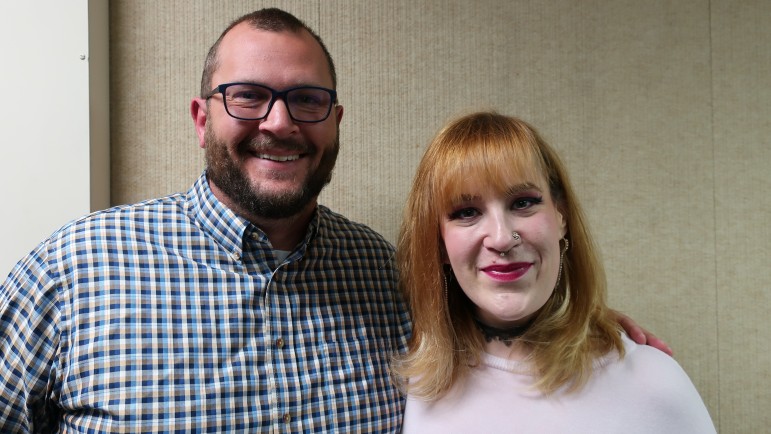StoryCorps is an oral history project where people from all backgrounds and beliefs share their life stories. This year, StoryCorps launched a new project called One Small Step, an effort to bring together Americans with differing political views not to argue about issues, but to get to know one another as human beings.
Those conversations have been happening in Birmingham too.
Nicole Watkins has mobility issues as a result of spina bifida. She identifies as a liberal with strong feelings about healthcare. Austin Suellentrop, a self-identified conservative, has strong feelings about abortion. Here is their conversation:
Austin Suellentrop (AS): Do you feel misunderstood by people who have different beliefs than you?
Nicole Watkins (NW): Every day.
AS: Ok.
NW: And I don’t think it’s necessarily for a lack of conversation. I think, to me, you don’t need to experience something in order to understand where a person is coming from.
AS: Right.
NW: That’s the blockade I feel like I face talking to people who have very different beliefs from me that it’s like when they reject how I feel about healthcare, I feel like they’re rejecting me and my existence.
Like, it’s sort of like “Oh, well, you don’t matter. Let’s focus on the bottom line or the dollars or the, or this other issue,” and I’m sort of like “I will die.” It feels very personal to me.
AS: Do you feel like because you do have a medical condition that you’ve dealt with your entire life that when people talk to you, that they talk differently to you as a result?
NW: Absolutely. I just spent last week at a conference in D.C. and I had to be in a wheelchair for part of it –
AS: OK.
NW: Because I had swelling from the plane. And folks I talked to on the first day of the conference and then the second day of the conference treated me like a 2-year-old in the wheelchair even though they had met me the day before.
AS: Yeah.
NW: And I was the same human.
AS: Right.
AS: An example of how I think my personal belief structure differs from the perception of my belief structure, right? My wife and I, for years, led youth group in our church. So we’re Catholic. ‘Cause that’s where we met was in youth group in high school. Every year, we would take them to Washington D.C., we’d participate in the March for Life.
And somehow because I would be outward with this idea that I would like to see, I’d like to see a world where abortion is no longer an option, that because of that, that one stance I’m now like somehow this radical evangelical avid Trump supporter.
NW: I see.
AS: And it’s like “Whoa,” no, like I’ve got a passion for this topic, for this thing. But I also think that the thing that drives my belief there is also the same thing that drives my belief that we should take care of the mother of that child, that we should take care of the abandoned refugee at the border, that we should take care of the poor and sick in our own neighborhoods. It’s the right to like a life that we take care of, but like that’s not the public persona of what somebody who goes to D.C. to march for that is.
AS: Yeah.
AS: They see a red hat with white letters. That’s the furthest thing from who I am.
NW: That’s actually exactly why I wanted to do this. Um, and I think that’s actually very refreshing to hear the consistency of belief there, because that’s and I will fully admit in this conversation to having had that bias before but. Right. And it’s also worth mentioning, full disclosure, please don’t run out of the room, I work for Planned Parenthood.
AS: Okay.
NW: So I mean and it’s, I didn’t…
AS: Oh no! I can’t talk to you anymore. We’ve a policy against that. [laughter]
So that gets my blood going a little bit. None of us are simple enough to be just thrown in a bucket. Like, we’re all too too darn complicated for that. And I think we can all do a better job of realizing the nuance in people there.
NW: “Nuance” I want on a bumper sticker. I think that the end result of having these conversations and storytelling needs to be that because people are so many things. Talking about earlier too, like, being disabled is a part of my identity. But it’s a part. Right? And it’s sort of you know going to the March for Life is a part of your identity but it’s not the whole thing.
AS: Right.
NW: Like, there is more to you than that.
AS: Totally.
NW: You are a father you are a husband you are all these things and I think we forget we’re talking to a whole person. If we can remember that when we have those conversations with each other I think we’ll get somewhere.
One Small Step on WBHM is made possible by the Corporation for Public Broadcasting
MUSIC CREDITS
“ELEGIAC MIX” BY BRYAN COPELAND

